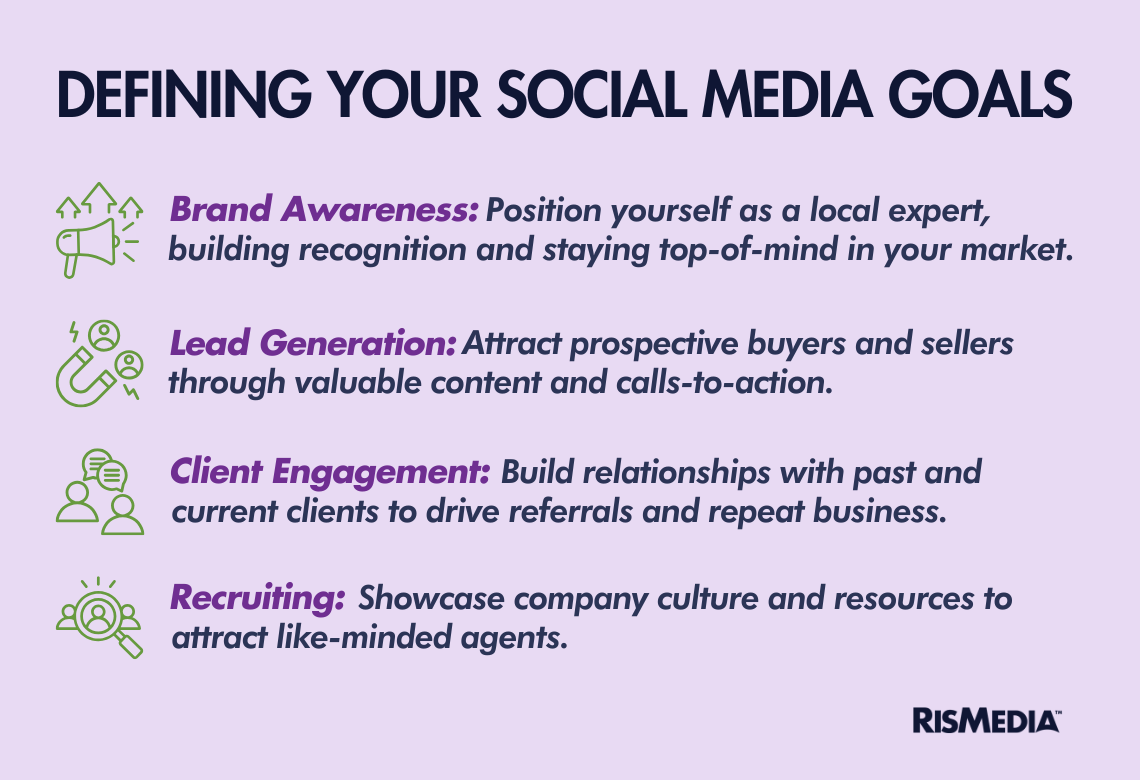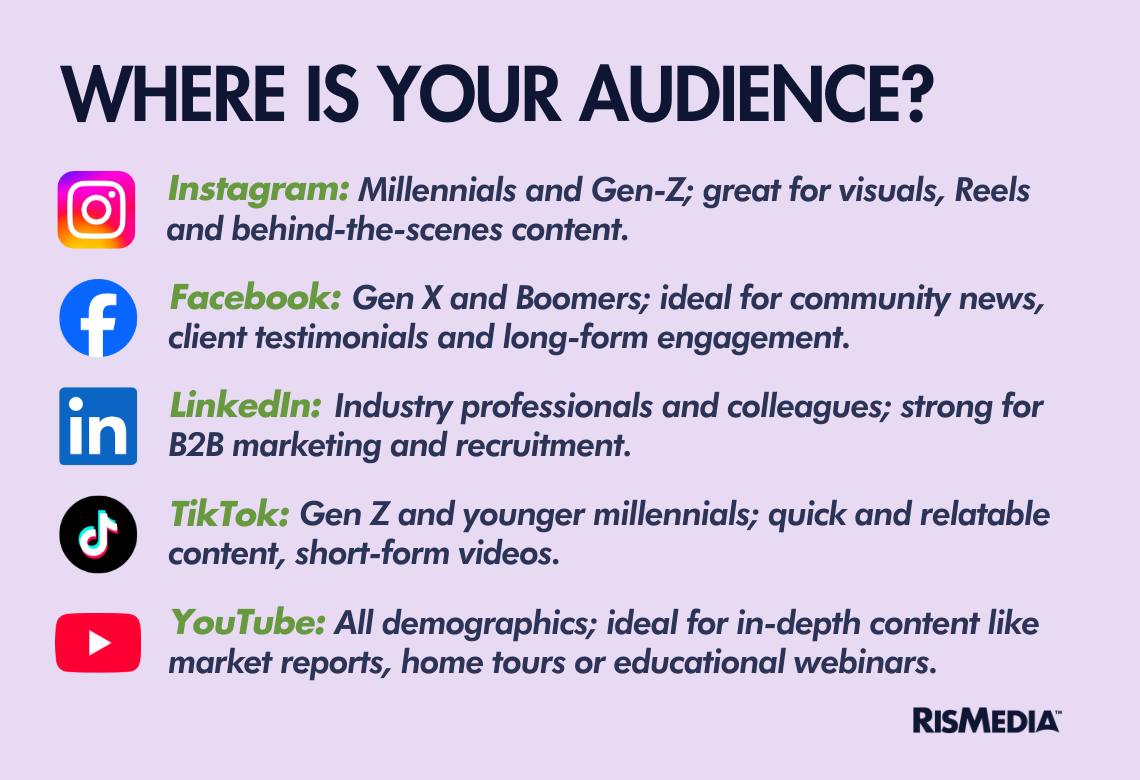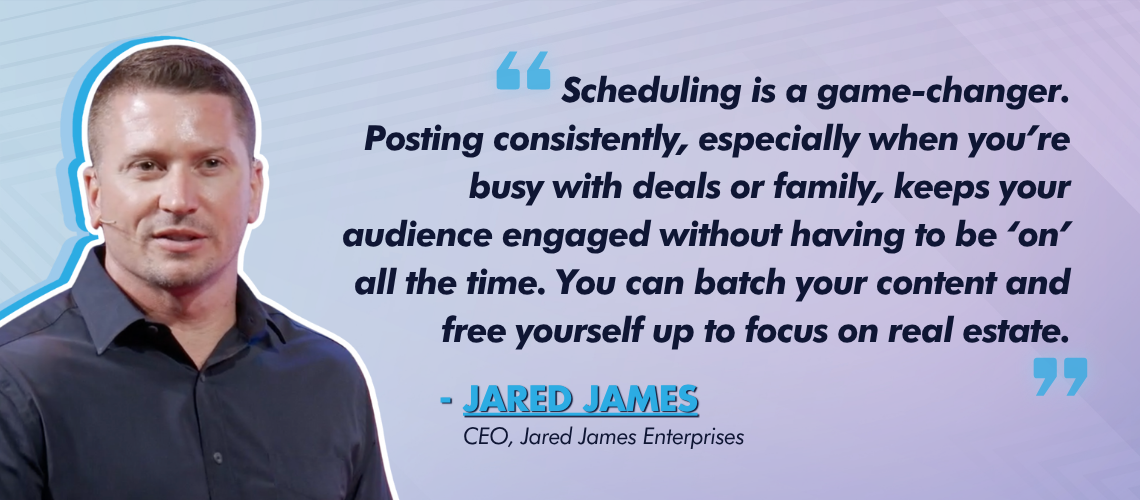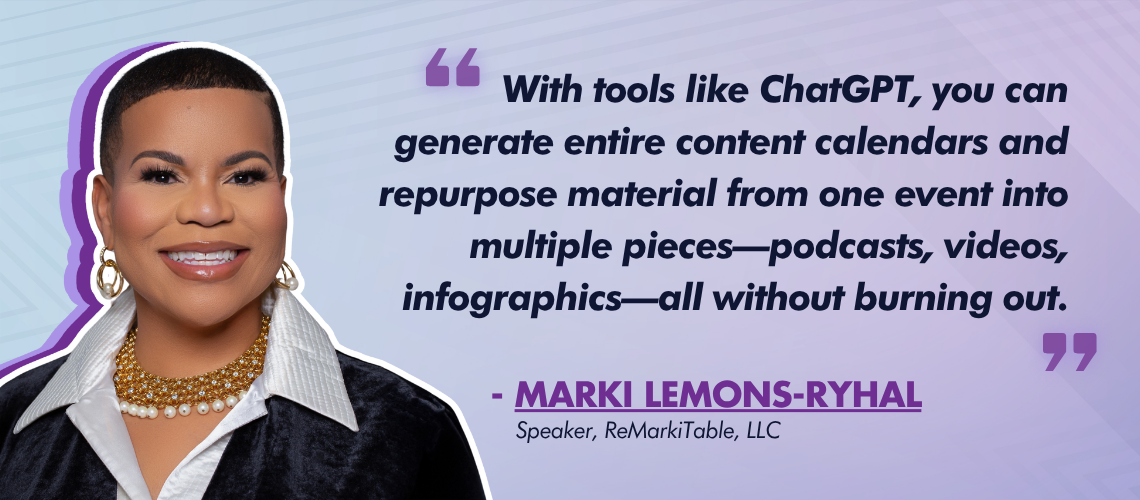Social media is no longer optional for real estate professionals—it’s essential. Whether you’re a solo agent looking to build your personal brand, a broker aiming to expand your team’s digital presence or a team leader working to recruit and retain talent, social media can be a powerful tool for growing your business. But success on social platforms doesn’t happen by accident. It starts with a strong foundation built on clarity, strategy and consistency.
Let’s dive into how to set yourself up for success on social media—defining clear goals, understanding your audience, and choosing the right tools and resources to make it all happen.
Defining your social media goals
Before you get to posting, it’s important to define your social media goals and objectives. Your goals should fall into a few key categories:

Read: How to Take Advantage of Client Reviews and Referrals
Once you clearly lay out and understand your goals, you can start prioritizing the type of content you create and which platforms to utilize. A newer agent who’s focused on visibility might lean heavily into Instagram Reels and local market videos, while a seasoned broker focused on recruitment may find more success posting team wins and behind-the-scenes culture content on LinkedIn.
Your social media goals should also align with your overall business strategy. If you have a quarterly goal of increasing listings, your social content should support that—through educational buyer or seller tips, market updates and targeted ads to homeowners in your market.
Jared James, founder of Jared James Enterprises and Fyrst Up, and successful real estate influencer, highlights the critical role of engagement in social media goals.
“My No. 1 objective is engagement.” he explains. “Engagement includes both view counts and actual comments, but more importantly, shares. My second objective is to gain followers. Followers aren’t as important as they used to be, but they’re still important because they let the platform know that people want to hear what you have to say.”
James emphasizes that engagement drives visibility and allows you to build a custom audience of followers who already know and like you—making future advertising and lead generation more effective.
“Your following matters because you can target the people that follow and engage with you as a custom audience,” says James. “This allows any ad or video you promote to be placed in front of people who already know you and like you, which greatly increases your conversion ratios.
“My videos are 95% brand building and awareness with the sole purpose of providing value. That leads to the continued growth in following and engagement that makes the lead generation so much easier.”
Once you’ve established your goals, tracking your performance is critical. Metrics, like engagement rate, reach, click-throughs and lead conversion all provide insights into whether your strategy is working. It’s important to remember that simple likes and follows aren’t the only indicators of success. Social media ROI is ultimately measured by the real-world business it brings in.
Marki Lemons-Ryhal, industry speaker, educator, author, founder of ReMarkiTable and agent with EXIT Strategy Realty, reinforces that goal-setting must be grounded in market data to find the fastest path to success, especially for new agents.
“The first place a new real estate agent should go is the Multiple Listing Service. Look for the fastest rate of sale at the highest price point with the fewest barriers to entry. That’s where you can build a niche in the least amount of time,” she says. “By looking at the numbers in the marketplaces you want to serve, you can identify who your customer is and then develop a brand to attract that clientele.”
Knowing your audience
In addition to defining your goals, understanding who you’re trying to reach is crucial. For most real estate professionals, your audience may include first-time homebuyers, sellers, investors, renters, etc. While each group requires a different communication style, tone and type of content, defining your niche can help you determine who your audience is, and how to attract them.
For James, while his broad audience is entrepreneurs, he shares that his core focus is more specific and highlights the importance of empathy in messaging.
“I always stop and think about who my next video is for and try to put myself in their place,” he says. “What are they thinking? What questions do they want answered? A first-time homebuyer has different concerns than a move-down buyer or an investor. You have to consider their worries and the mixed signals they may be receiving.”
Lemons-Ryhal takes this personalization a step further, using artificial intelligence (AI) to tailor communication styles to client personalities.
“AI allows us to run DISC (Dominance, Influencer, Steadiness, Conscientiousness) profiles on our clients to see how they like to be talked to,” she says. “If I speak to you the way you want to be spoken to, you’re more likely to do business with me.”
By integrating AI tools like Humanistic AI with CRM systems, agents can tag clients by personality and reverse-engineer messaging to improve connection and conversion rates.
“Social media has entered the ‘no excuse zone.’ From one livestream or open house, you can repurpose content into 20 different pieces—videos, podcasts, checklists, images—using tools like ChatGPT and NotebookLM,” says Lemons-Ryhal, highlighting how AI can help agents overcome content creation barriers. “The technology allows you to scale your presence without scaling your time.”
Once you understand your ideal audience, mapping that to platform demographics is your next step. Here’s a general breakdown of where different audiences may spend their time:

Keep in mind that if you try to master each platform and demographic, you may make it harder to connect with anyone—though diversifying your social media presence is important for when a platform runs into trouble. Narrowing down your focus doesn’t limit your opportunities—it clarifies your message and attracts your most valuable leads.
Key social media tools for real estate
Now that you’ve defined your goals and target audience, it’s time to choose the right tools to execute your strategy efficiently and effectively. From scheduling tools and design platforms to utilizing AI, here are a few options you can use in your social media strategy:
- Scheduling tools: Post with purpose
Social media success depends on consistency, and scheduling tools like Later, Hootsuite or Meta Business Suite allow you to plan ahead and post strategically, rather than reactively.
“Scheduling is a game-changer,” says James. “Posting consistently, especially when you’re busy with deals or family, keeps your audience engaged without having to be ‘on’ all the time. You can batch your content and free yourself up to focus on real estate.”
- Design tools: Easy and eye-catching
Whether you’re building a brand or promoting a listing, high-quality visuals make all the difference. Tools like Canva offer ready-made templates, brand kits and drag-and-drop features to quickly create professional-looking posts, infographics and video thumbnails.

“Canva has really leveled the playing field,” says Lemons-Ryhal. “You don’t need to hire a designer or spend hours learning software. It’s fast, intuitive, and lets agents create professional content that resonates.”
Design platforms like Canva also integrate with scheduling tools, helping you create and distribute content in one seamless workflow.
- Video editing: Simple and sharp
Short-form video is king on platforms like Instagram, Facebook, TikTok and YouTube Shorts. While tools like Adobe Premier offer robust editing options, most agents can get great results using Canva’s built-in video features or apps like CapCut and InShot directly from their phones. Focus on clean, engaging edits, utilizing subtitles, trending audio or voiceovers. And remember, your goal is ultimately connection, not perfection.
- Analytics: Measure what matters
Native insights tools, such as Instagram Insights, Facebook Analytics and YouTube Studio offer detailed performance data to help refine your approach over time.
“I focus on engagement rates and watch-time more than just likes or followers,” James explains. “These numbers tell you if your content is truly connecting with your audience. The goal isn’t just visibility—it’s meaningful interaction that leads to business.”
Analytics also help identify the best times to post, content types that resonate the most and opportunities to repurpose or expand top-performing posts.
- Artificial intelligence: A creative assistant
AI is quickly becoming a necessary tool for content creation. ChatGPT, or other AI tools, can help you generate ideas for content, create captions for your posts and even flesh out your posting schedule and strategy.
“AI has taken away the ‘no excuse’ for not posting regularly,” says Lemons-Ryhal. “With tools like ChatGPT, you can generate entire content calendars and repurpose material from one event into multiple pieces—podcasts, videos, infographics—all without burning out.”
She also emphasizes using AI to save time—not skip strategy. “You still need your unique voice. Use AI as a tool to amplify your message, not replace it.”

In addition to platform-specific tools, having a management system for your content is key to staying organized. Google Drive and Dropbox offer the ability to create separate folders—for Reels, listing graphics, testimonials and more—so you can quickly repurpose or repost when needed.
Staying educated about platform updates is also important when executing your social media strategy. As algorithms evolve, and new features are introduced, what works today may not work tomorrow. Doing your research, attending industry webinars such as RISMedia’s Webinar Series and following social media experts can help you stay ahead of the curve.
Laying the foundation for social media success isn’t about being everywhere all at once or posting endlessly. It’s about being intentional and informed. When you align your content with your business goals, speak directly to your target audience and leverage tools that enhance your efficiency, you’ll be well-positioned to make an impact on social media and in your real estate business.



